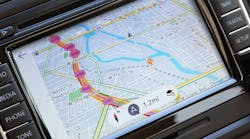Here, a digital mapping company based in Berlin, revealed a new service on Monday that warns drivers about accidents and locates open parking spaces by extracting data from cameras and sensors inside hundreds of thousands of cars.
It gives the company increased firepower to rival other digital mapmakers. One budding rival, Waze, is a navigation app that pools information from millions of smartphones to plot traffic patterns and alert drivers about accidents and constructions. Google is also using it to help commuters join carpools in San Francisco.
Here has focused on mapping roads using laser-based radars and other sensors, providing data about traffic patterns to cars with dashboard navigation systems. Here's new service, which will debut at the Paris Motor Show this week, expands the number of sources it collects data from. It uses crowd-sourcing to share data between cars manufactured by different brands.
In addition to sharing data from cameras and radars, automakers will also combine data from unlikely sources. For example, the service will extract data from windshield wipers and brakes to warn drivers about wet road conditions or construction work that has slowed traffic. The data is transmitted to the cloud, where it is analyzed, and then distributed in real-time to other cars on the road.
The data can be used to enhance autonomous cars, which need a detailed view of other cars on the road to drive without human intervention. Many experts said that the fatal crash of a Tesla Model S driving in “autopilot” mode might have been prevented if all the vehicles on the road had been sharing location data.
Here, which was previously owned by Nokia, was acquired by German automakers Audi, BMW, and Daimler for $3.1 billion in 2015. Cars built by these brands will have early access to the new service.
Here is not the only digital mapmaker vying for subscribers. Mobileye, an automotive vision chipmaker, has also released a crowd-sourcing service, which extracts information about road conditions and traffic from cameras embedded in cars. It transfers that data to the cloud and sends it out to automakers that subscribe to the service.
It is unclear what impact the new service will have in a deal that BMW signed earlier this year to develop autonomous cars with Mobileye and Intel.
Google purchased Waze for $1.1 billion in 2013, but the search engine has advanced its mapmaking agenda in other ways. It recently acquired Urban Engines, which gathers data from pedestrians and other sources to suggest the quickest routes for commuters.
Many automotive companies are piling into digital cartography. Ford recently invested in Civil Maps, a California start-up that uses artificial intelligence to organize data from cameras and other sensors embedded in cars. The company’s software renders down the most important data, making it easier to transmit over cellular networks.
Here plans to expand its service to other automakers, so that it can collect more data and create richer views of the road. If more cars are braking, the service can inform drivers further down the road that traffic is slowing. Here could then use cameras embedded in the vehicle to read the construction signs advising drivers to slow down. Analyzing location data and camera images in cities could help drivers find open parking spaces.
But the service also raises questions about organizing and protecting the data. Here said that it is working on a standard for combining automotive data from multiple sources, so that it can be easily pooled from millions of vehicles, brewed in the cloud, and distributed anonymously.
Matthias Mohlig, Here’s product manager for automotive services, explained that the automakers subscribing to its service were initially hesitant at sharing sensitive data with each other. Controlling vehicle data is one of the main reasons that they are investing in technology and not using software from companies like Google and Apple.
Mohlig acknowledged that privacy would remain a challenge in the early stages of the new service. “We have to be extremely diligent over privacy, making sure we are completely compliant with privacy laws,” he wrote in a blog post.
Another question is whether the cellular networks that shuttle data between vehicles and the cloud are fast enough to send real-time updates. And automakers appear to be acutely aware of the potential challenges: Audi, BMW, and Daimler recently created an organization to build and test fifth-generation, or 5G, wireless technology for connected cars.
Here’s service will be available to Audi, BMW, and Daimler vehicles in 2017. But the company believes that the benefits of crowd-sourcing will outweigh privacy concerns and lure other brands to the service.
“What we are seeing today is the technology and automotive industries coming together to create services that will elevate the driving experience,” Edzard Overbeek, HERE’s chief executive, said in a statement. “These new services are just the beginning.”

